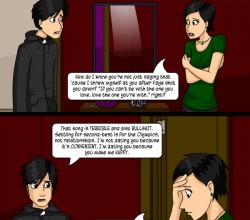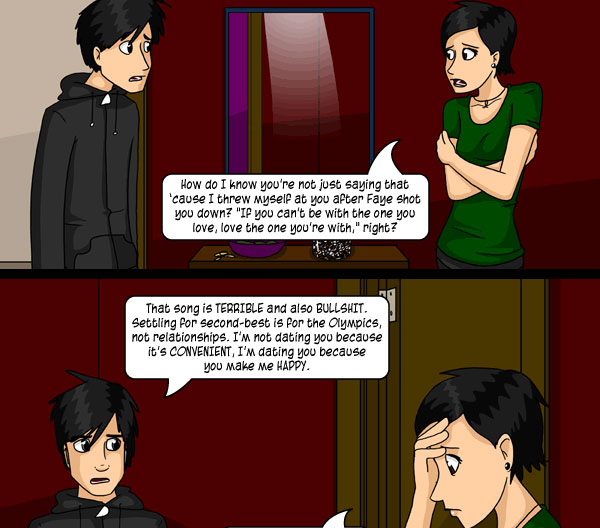 A friend of mine recently posted a link to a webcomic I used to read regularly.
A friend of mine recently posted a link to a webcomic I used to read regularly.
Following that link did two things: 1) It made me realize just how long it’s been since I’ve checked in on the characters in that strip and 2) it reminded me just why I loved the comic so much to being with.
The webcomic is Questionable Content, the ongoing saga of the wild, awkward, and sometimes all too familiar interactions of a bunch of friends in Massachusetts… and a couple of robots. While the strip’s initial claim to fame may have been it’s nods to indie rock and snarky style, what’s always caught my attention is how well creator Jeph Jacques presents the subtleties (and not-so-subtleties) of interpersonal relationships. The dialog rings true and the art often captures those very telling bits of body language that most of us kick ourselves for not noticing sooner. (If you want to learn more about the comic and what you’ve missed, check out its Wikipedia entry.)
After bouncing back a handful of pages in the current story, I did some random jumping around, trying to catch up a little on what I’ve missed (and, boy, have I missed a lot–the strip publishes daily and it’s been at least a couple of years since I read it regularly). Before long, I came across one particular plot I remembered.
It’s one of those that nails one of the issues that comes up often when I’m talking about relationships with people.
A Negative Spiral Is Triggered
In the strip, Marten has just mentioned in passing that he still cares about his exes. His girlfriend, Dora, takes great offense to this idea. Probably a little more quickly than would happen in real life, she admits that her anger is caused by the fear that Marten will leave her for one of them.
“Just because I still care about [my ex] Faye doesn’t mean I’d rather date her than you,” Marten tells her.
“How do I know you’re not just saying that ’cause I threw myself at you after Faye shot you down?” Fay asks (with body language that screams of fear and a deep insecurity). “‘If you can’t be with the one you love, love the one you’re with,’ right?”
How many times have you been on one side of this conversation? Been on the other one, too? I have.
When our insecurities and fears are triggered, we start into a negative spiral. We begin to doubt ourselves, we begin to doubt all the good times we’ve had in a relationship, we even begin to doubt the sincerity of people who’ve never lied to us about anything before. That’s the space that Dora is in.
On the other side, Marten is just trying to be honest. Even though they’re his ex girlfriends, he still cares about them and, at least in the case of Faye, wants to include them in his life. This is especially problematic when the ex is (or was) part of the group of “regulars” that hang out together. And in this case, well, Faye is a friend and employee of Dora.
Now, when he opened his mouth, Marten didn’t know his honest concern for a mutual friend (who happens to be an ex) would open up a can of worms. From experience, though, mos of us know that something like this often does end in a fight. So we don’t say things about caring about our exes. We stop ourselves and keep that (now platonic) Love bottled up inside when we’re with our significant other. Why? Because we don’t want to have to try to explain it, because we know there are all those song lyrics that can be quoted back at us.
The Real Problem
The real problem with not openly expressing ideas and feelings like the enduring (platonic) Love directed toward and ex is that, no matter what, it still gets expressed in our actions. Over time, your significant other will pick up on those subtle actions and will raise the question. Then, you’re faced with two choices: lie or tell the truth.
Lying never solves anything and will dig you into a deeper hole every time you do it. That way leads only to more pain for both of you in the long run.
Being honest leads you to the same place Marten has ended up–except now he’d be on the defensive from the start, which is a much more difficult position to be heard (and believed) from. Especially if your own fear responses are triggered.
In the strip, Marten comes back with a fantastic answer that helps stop Dora’s negative spiral:
“That song is TERRIBLE and also BULLSHIT. Settling for second-best is for the Olympics, not relationships. I’m not dating you because it’s CONVENIENT, I’m dating you because you make me HAPPY.”
That works because it’s just as true as him saying he still cares about his exes. If it was just a line, it wouldn’t have worked quite as well unless he was a skilled manipulator.
The Bottom Line
The bottom line of all this is that there are two things that matter in situations like this: Your Feelings and Your Honesty.
There needs to be that internal understanding of the difference between your romantic and platonic (or nostalgic) feeling. If you don’t have a handle on that and you find yourself in a situation like this, it will not end well unless you are very, very lucky.
Once that understanding is there, you have to be confident that your significant other will believe you when you try to explain the difference between her and your ex. There needs to be a track record of honesty to fall back on, otherwise any explanation will run hollow and fall short. Internally, there has to be a track record of acting properly on the feelings you do have.
There is such a thing as “nothing more than feelings.” Sure, you care about your exes, but there’s no romance in those feelings. And, even if there were still a little, you’re not–and haven’t–acted on it. Why? Because you’re happy with who you’re with. Really happy. Honestly happy.
If any of that isn’t true, well… it’ll come out in the long run and it won’t be pleasant.
